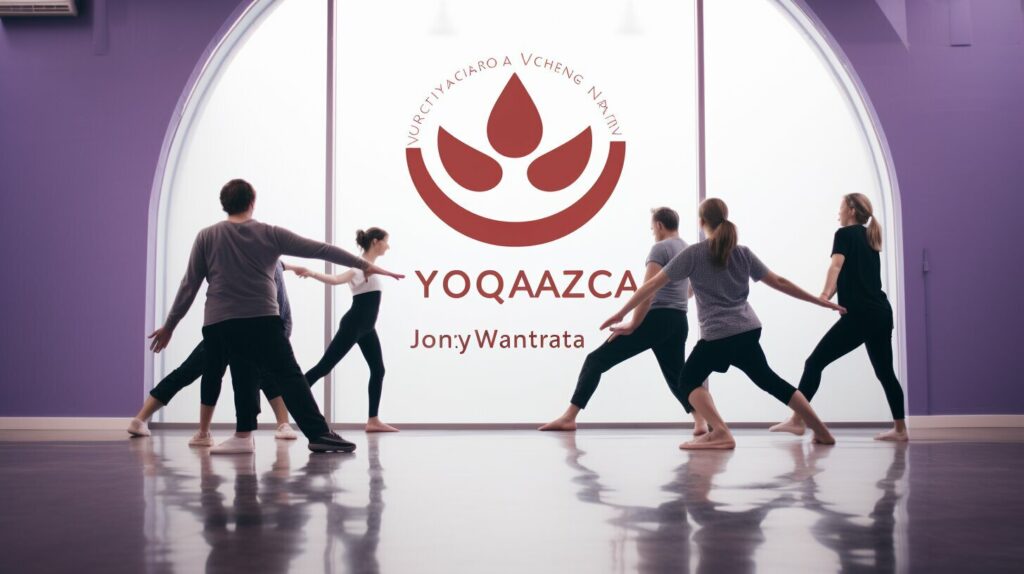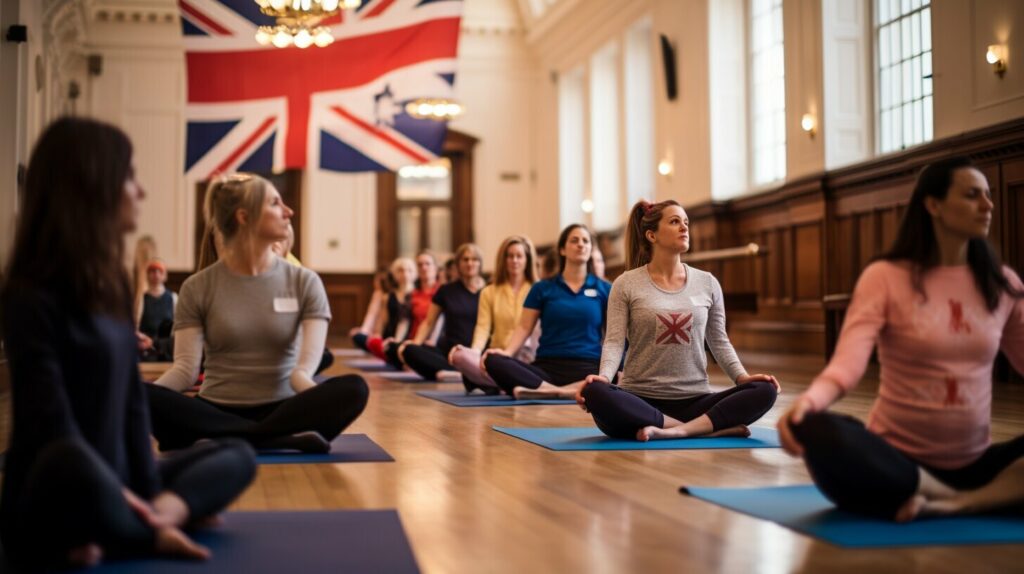Yoga has become increasingly popular in recent years, with many people turning to this ancient practice for its physical, mental, and emotional benefits. However, as the popularity of yoga grows, so too does the need for regulation in the UK.
So, is yoga regulated in the UK? The answer is yes, the yoga industry is regulated in the UK. There are existing regulations and standards that apply to yoga instruction and practice in the country.
In this article, we will explore the topic of yoga regulation in the UK, taking a closer look at the current landscape and the governing bodies responsible for overseeing the industry. We will also discuss the benefits and challenges of yoga regulation, and what the future may hold for this constantly evolving field.
- The yoga industry in the UK is regulated, with existing regulations and standards in place.
- Yoga teachers in the UK must fulfill certain certification and legal requirements to operate.
- There are governing bodies responsible for overseeing the industry and maintaining standards.
- Proper yoga teacher training is important for maintaining high standards in the industry.
- The benefits of yoga regulation include protecting the interests of instructors and practitioners, and contributing to overall industry growth and development.
The Current Landscape of Yoga Regulation in the UK
If you’re looking to become a yoga teacher in the UK, it is essential to understand the certification and legal requirements that you will need to fulfil. While yoga itself is not a regulated activity, the yoga industry in the UK has certain standards and expectations that teachers need to meet.
Yoga Certification Requirements UK: To become a yoga teacher in the UK, you must have completed a yoga teacher training program from a reputable source. While there are no specific certification requirements, most employers and insurance providers will require certification from a recognised training centre.
Legal Requirements for Yoga Teachers UK: In the UK, yoga teachers are not required to have a specific license to teach. However, they are required to have basic legal knowledge to operate a business and follow health and safety guidelines. They must also have public liability insurance, which covers them in case a client is injured during a yoga class.

It is worth noting that while the yoga industry in the UK is not regulated, there are certain bodies responsible for overseeing the industry. The British Wheel of Yoga and Yoga Alliance Professionals are two examples of organisations that provide guidance, support, and standards for yoga teachers in the UK.
The Role of Yoga Teacher Training in the Regulatory Framework
Proper training is essential for maintaining high standards in the yoga industry. It is the responsibility of yoga teacher training programs to provide the necessary knowledge and skills to teach yoga safely and effectively. Many training programs are accredited by the Yoga Alliance or other organisations, which can provide additional credibility and recognition.
While certification is not required in the UK, completing a recognised training program is highly recommended. It provides validation of your skills and knowledge, which can help you stand out in a competitive yoga market and gain the trust of potential clients.
Yoga Accreditation and Governing Bodies in the UK
When it comes to ensuring the quality of yoga instruction in the UK, accreditation and governing bodies play a crucial role. Yoga accreditation is the process by which an organization or individual is recognized as meeting certain standards or requirements in the yoga industry. The purpose of accreditation is to provide a level of assurance to the public that the yoga instructors they are working with are qualified and competent.
In the UK, several governing bodies oversee the yoga industry and provide accreditation to yoga teacher training programs and individual instructors. The main governing bodies include:
| Governing Body | Description |
|---|---|
| The British Wheel of Yoga | The British Wheel of Yoga is the largest yoga membership organization in the UK. It provides accreditation to teacher training programs and individual instructors. |
| The Yoga Alliance Professionals | The Yoga Alliance Professionals is an international governing body that provides accreditation to yoga teacher training programs and individual instructors who meet their standards. |
| The Independent Yoga Network | The Independent Yoga Network is a non-profit organization that provides accreditation to yoga teacher training programs and individual instructors who meet their standards. |
These governing bodies provide a range of benefits to both yoga instructors and practitioners. They ensure that yoga training programs meet certain standards, that instructors have appropriate training, and that continuing education and professional development opportunities are available. They also provide a platform for networking, information sharing, and advocacy on behalf of the yoga industry.
Accreditation by these governing bodies is not mandatory in the UK, which means that some yoga instructors may choose not to be accredited. However, being accredited can provide a level of credibility and professionalism that can be beneficial for instructors looking to grow their businesses or work in certain settings, such as gyms or wellness centers. It can also provide reassurance to practitioners that they are working with qualified and competent instructors.

While accreditation and governing bodies play an important role in ensuring the quality of yoga instruction in the UK, it is ultimately up to individuals to do their due diligence when choosing a yoga instructor. This includes checking their qualifications and experience, as well as reading reviews and testimonials from other practitioners.
Understanding Yoga Licensing in the UK
Yoga is a popular practice that has been gaining popularity in recent years. It is important to understand the requirements and processes involved in obtaining a yoga teaching license in the UK.
In the UK, there is no legal requirement for yoga teachers to hold a license or to be registered with a specific governing body. However, certain institutions and accreditation bodies may require individuals to have certain qualifications to teach yoga, and some local councils may require yoga teachers to obtain a license to operate in their area.
For example, the British Wheel of Yoga, the largest yoga membership organization in the UK, requires their members to hold a recognized yoga teaching qualification and obtain insurance before teaching yoga. The Yoga Alliance Professionals, another leading yoga accreditation body in the UK, requires their members to complete a minimum of 200 hours of yoga teacher training and to hold current first aid certification.
Local councils may also require a license for yoga practitioners to teach in their area. For example, in London, yoga teachers may need to obtain a license from the London Borough of Hackney to teach in certain public spaces. The requirements and costs for obtaining a license may vary depending on the location.
It is important for yoga teachers to research and understand the requirements for licensing and accreditation to ensure they are operating legally and safely in the UK.

In the UK, there are several standards and guidelines in place to regulate the practice of yoga. These standards are designed to ensure the safety and well-being of both yoga teachers and practitioners.
One of the primary standards for yoga in the UK is the British Wheel of Yoga (BWY). This organization is responsible for setting standards for yoga teacher training and practice in the UK. They provide a range of courses and training opportunities to ensure that yoga teachers are equipped with the necessary skills and knowledge to teach yoga safely and effectively.
In addition to the BWY, there are several other governing bodies in the UK that oversee yoga practice and instruction. These organizations include the Yoga Alliance Professionals, the Independent Yoga Network, and the Yoga Teachers Fellowship.
These organizations work together to ensure that yoga teachers in the UK adhere to a set of standards and guidelines. These guidelines cover areas such as health and safety, ethics and conduct, and teaching methods.
Yoga teachers in the UK are also required to hold a certification from a recognized yoga teacher training program. This training must meet certain standards and requirements, as set forth by the governing bodies mentioned above.
Overall, the standards and guidelines in place for yoga in the UK are designed to maintain high levels of safety and quality in the industry. By adhering to these standards, yoga teachers can ensure that they are providing their students with a safe and effective practice.

In the UK, yoga teacher training programs play an important role in the regulatory framework of the industry. These programs are responsible for providing aspiring yoga teachers with the necessary knowledge and skills to deliver safe and effective instruction to their students.
While there are no legal requirements for yoga teachers to have specific training or qualifications, most reputable yoga studios and employers require certification from recognized training programs. The most common yoga teacher training certification in the UK is the Yoga Alliance Professionals certification.
The Yoga Alliance Professionals is a governing body that sets standards for teacher training programs in the UK. To receive certification from the Yoga Alliance Professionals, training programs must meet certain requirements and follow specific guidelines. These include minimum hours of training, a specific curriculum, and experienced and qualified instructors.
Once a yoga teacher completes a certified training program, they are expected to continue their education and training to maintain their certification. This ongoing education helps to ensure that teachers stay up-to-date with the latest developments and standards in the industry.

Proper yoga teacher training is crucial to the regulatory framework of the industry in the UK. It helps to ensure that teachers have the necessary knowledge and skills to provide safe and effective instruction to their students. By setting standards for teacher training programs and certifying qualified instructors, the Yoga Alliance Professionals plays a vital role in maintaining the quality of yoga instruction in the UK.
Understanding the Benefits of Yoga Regulation
Yoga has become increasingly popular over the years, with many individuals turning to it as a form of exercise, relaxation, and spiritual practice. However, with the growth of the industry comes the need for regulation to ensure that standards are maintained and the interests of both yoga instructors and practitioners are protected. Here, we will explore the benefits of yoga regulation in the UK and how it contributes to the growth and development of the industry.
One of the key benefits of yoga regulation in the UK is the establishment of standards and guidelines that ensure the safety and wellbeing of practitioners. Regulations help to ensure that instructors are properly trained and qualified to teach yoga, and that they follow best practices, such as providing safe and suitable environments for practice. This helps to reduce the risk of injury and ensure that practitioners receive quality instruction that meets their needs and goals.
Regulation also helps to maintain a level playing field within the industry, ensuring that all yoga instructors are held to the same standards and regulations. This helps to prevent unethical practices and protect the interests of both yoga instructors and practitioners. It also contributes to the growth and development of the industry, as it helps to build trust and credibility with the wider public and attract new practitioners to yoga.
Moreover, yoga regulation in the UK helps to support the development of professional networks and communities within the industry. This enables instructors to share best practice, learn from one another, and build relationships that can help them to grow and develop in their careers. It also provides opportunities for collaboration and innovation, as instructors work together to improve standards and develop new approaches to teaching yoga.
Overall, yoga regulation in the UK plays an important role in ensuring the safety and wellbeing of practitioners, establishing standards and guidelines, and contributing to the growth and development of the industry. As the popularity of yoga continues to grow, the need for effective regulation will become increasingly important in maintaining the quality and integrity of the practice.

While there are clear benefits to the regulation of the UK yoga industry, there are also some challenges and criticisms surrounding the current regulatory framework. One of the main concerns is the lack of consistency in certification and accreditation requirements across different yoga styles and traditions. Without a unified standard, it can be difficult for practitioners to assess the quality of instruction and for instructors to navigate the requirements.
Another criticism is the potential cost and burden for small yoga businesses and independent instructors to comply with regulations. Some argue that the regulatory framework may favor larger, more established yoga studios and organizations, while making it harder for smaller businesses to operate.
There are also concerns about the role of governing bodies in the regulation of yoga. While their oversight can provide structure and accountability, some argue that their power and influence can stifle innovation and diversity within the industry.
Furthermore, some practitioners and instructors feel that the current regulations do not encompass the full scope of yoga practices, particularly those that have spiritual or philosophical roots. They argue that a more holistic approach to regulation is needed to recognize the broader cultural significance and diversity of yoga.
Despite these challenges, it’s clear that regulation can play an important role in ensuring the safety and quality of yoga instruction, protecting the interests of both instructors and practitioners, and promoting industry growth and development. Recognizing and addressing these criticisms can help shape a more effective and inclusive regulatory framework for the UK yoga industry.

As the yoga industry in the UK continues to grow, the need for regulation becomes increasingly important. The benefits of regulation are clear; it ensures the safety and well-being of yoga practitioners and helps maintain high standards in the industry. However, the regulatory landscape in the UK is constantly evolving, with new developments and challenges emerging all the time.
One potential area for future development is the establishment of a single governing body for yoga in the UK. At present, a number of different organizations are responsible for regulating yoga, which can lead to confusion and inconsistencies. A centralized governing body could help streamline processes and ensure consistency in standards across the country.
Another area for potential development is the use of technology to facilitate regulation. Digital platforms could be used to track and monitor qualifications and certifications, making it easier for yoga instructors to demonstrate their qualifications and for regulators to monitor compliance with standards.
Despite these potential developments, there are also challenges facing the future of yoga regulation in the UK. One key challenge is balancing regulation with the need for flexibility and creativity in the practice of yoga. Some argue that overly strict regulation could stifle innovation and limit the diversity of yoga offerings in the UK.
Overall, the future of yoga regulation in the UK is likely to be shaped by a variety of factors, including economic, political, and social developments. However, whatever direction regulation takes in the coming years, it is clear that the need for regulation will only continue to grow as the popularity of yoga in the country continues to rise.
Yoga Regulation Compared to Other Countries
Yoga regulation in the UK is not unique, as many countries around the world have also implemented regulations and standards for the yoga industry. In the United States, for example, yoga teachers are required to obtain a Yoga Alliance certification and are subject to ongoing education and training requirements. Similarly, in Canada, yoga teacher training programs must be registered with the Yoga Alliance, and teachers must adhere to a code of ethics and standards of conduct.
India, the birthplace of yoga, does not have a formal regulatory body for yoga instruction, but the government has taken steps to recognize yoga as a traditional form of medicine and has established a certification system for yoga teachers. Other countries such as Australia, New Zealand, and Germany also have regulations in place for yoga instruction.
While the specifics of yoga regulation may vary from country to country, the overarching goal is often the same: to ensure that yoga instructors are properly trained, to protect the safety and well-being of yoga practitioners, and to maintain the integrity of the yoga industry. As such, the UK’s approach to yoga regulation is in line with other countries’ efforts to promote safe and effective yoga instruction.

The UK’s regulatory framework for the yoga industry is constantly evolving, as are the regulations in other countries. It is important for yoga instructors and practitioners alike to stay informed of the latest developments and to be proactive in maintaining high standards in the industry.
The Impact of Brexit on Yoga Regulation in the UK
As the UK navigates its exit from the European Union, there has been much speculation on how this will affect various industries and sectors. The yoga industry is no exception, and there are concerns over how Brexit will impact yoga regulation in the UK.
One of the main areas of concern is the potential loss of funding and support from the EU. Currently, the UK has access to various EU funding streams that support the yoga industry, including those aimed at improving the skills and knowledge of yoga teachers. The loss of this funding could make it more difficult for yoga teachers to access training and certification, which could have a knock-on effect on the quality of instruction.
Another concern is the potential disruption to the free movement of goods and services between the UK and EU. This could impact the ability of UK-based yoga teachers and studios to work and operate in EU countries, and vice versa. It may also complicate the process of obtaining certification and licensing for yoga teachers who wish to work across borders.
On the other hand, Brexit may also present opportunities for the UK to develop its own regulatory framework tailored to the needs of the country’s yoga industry. This could allow for more focused and effective regulation, with the potential to improve the quality of instruction and promote industry growth.
Overall, the impact of Brexit on yoga regulation in the UK remains uncertain. While there are concerns over the potential loss of funding and disruption to free movement, there may also be opportunities for the UK to take a more tailored approach to regulation. It will be important for the yoga industry to keep a close eye on developments and adapt accordingly.

In conclusion, the world of yoga regulation in the UK is complex and multi-layered. As we have explored throughout this article, the answer to the question “Is yoga regulated in the UK?” is a resounding yes. There are existing regulations, standards, and governing bodies that oversee the industry and ensure quality instruction for practitioners.
However, as we have also seen, there are challenges and criticisms surrounding yoga regulation. These range from concerns about excessive bureaucracy to questions about the effectiveness of current standards and guidelines.
Despite these challenges, the benefits of yoga regulation in the UK are clear. Regulation helps protect the interests of both teachers and practitioners, and contributes to the growth and development of the industry.
Looking towards the future, it will be important to continue exploring and refining the regulatory framework for yoga in the UK. This will include addressing current challenges and evolving with changing societal and political contexts, such as the impact of Brexit on the regulatory landscape.
All in all, yoga regulation in the UK is an important topic that requires ongoing attention and discussion. By engaging in thoughtful dialogue and continuing to work towards robust standards and guidelines, we can ensure that the benefits of yoga are accessible to all while maintaining high levels of quality and safety.
FAQ
Q: Is yoga regulated in the UK?
A: Yes, yoga is regulated in the UK. There are existing regulations and standards applied to the yoga industry in the country.
Q: What are the certification requirements for yoga teachers in the UK?
A: The certification requirements for yoga teachers in the UK may vary. However, there are legal obligations that need to be fulfilled in order to operate as a yoga teacher in the country.
Q: Are there governing bodies responsible for overseeing the yoga industry in the UK?
A: Yes, there are governing bodies in the UK that are responsible for overseeing the yoga industry and maintaining standards. These bodies play a crucial role in ensuring the quality of yoga instruction.
Q: How can I obtain a license to teach yoga in the UK?
A: To obtain a license to teach yoga in the UK, you will need to fulfill certain requirements and go through a licensing process. The specific requirements and process may vary, so it’s advisable to research and consult with relevant authorities.
Q: What are the standards and guidelines for yoga in the UK?
A: The UK has standards and guidelines in place to regulate yoga. These standards outline the expectations and best practices that yoga instructors are expected to adhere to.
Q: What role does yoga teacher training play in the regulatory framework in the UK?
A: Yoga teacher training programs play a significant role in the regulatory framework in the UK. Proper training is essential for maintaining high standards and ensuring the quality of yoga instruction.
Q: What are the benefits of yoga regulation in the UK?
A: Yoga regulation in the UK offers several benefits. It helps protect the interests of both yoga instructors and practitioners, and contributes to the overall growth and development of the industry.
Q: What are some challenges and criticisms of yoga regulation in the UK?
A: There are various challenges and criticisms surrounding yoga regulation in the UK. Different viewpoints and concerns have been raised by stakeholders in the industry.
Q: What does the future hold for yoga regulation in the UK?
A: The future of yoga regulation in the UK is an ongoing topic of exploration. There may be potential developments and changes within the regulatory landscape as the industry continues to evolve.
Q: How does yoga regulation in the UK compare to other countries?
A: Yoga regulation in the UK may have similarities and differences compared to regulations in other countries. It is interesting to examine how the UK’s approach to yoga regulation compares internationally.
Q: How will Brexit impact yoga regulation in the UK?
A: The potential impact of Brexit on yoga regulation in the UK is a subject of discussion. Leaving the European Union may influence the regulatory framework for yoga in the country, and further analysis is required.
